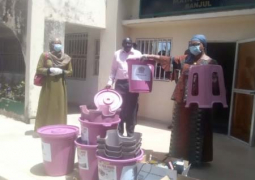The activity was part of the GFATM through ActionAid International The Gambia funded HIV/AIDS and life skills activities for schools, PHEs.
The competition brought together young people in their capacity as peer health educators in schools to interact, learn and share experiences on the ten critical life skills components using drama.
Twelve schools, six upper basic schools and six senior secondary schools comprising winners at the regional level would participate in the national event.
The winners in the upper basic schools category are Kabafita UBS in region 2 with 99 points, 22nd July Academy UBS in region one in second position with 93 points. Janjanbureh UBS in region five came third with 75 points.
In the senior secondary schools category, Nusrat SSS in region one became the winner with 109 points, Armitage SSS in region fivewas in second position with 97 points, while Diabugu SSS in region six came third with 96 points.
Speaking at the ceremony held at the OB Semega Janneh hall in Tallinding,Abdou Kanteh, programme manager NSGA, told the gathering that this was a nation-wide competition as it involved selected schools from across the country.
Kanteh said the purpose of the event was to deliver on commitments toward achieving MDG6 which is to combat HIV/AIDS, malaria and other diseases.
In the fight against HIV/AIDS, the national objective is to reduce the prevalence of HIV in The Gambia from 2.8 per cent to 2 per cent by 2014.
According to HIV/AIDS statistics, in 2011 for sub-Saharan Africa 14,000 people were living with HIV; out of this number 7,700 are women and about 4,500 kids have been orphaned by AIDS.
Kanteh added that NSGA works mainly in schools, but also in communities targeting youths within the age brackets of 14 to 24 years, nothing that NSGA uses the peer health education (PHE) model to reach out to a large number of youths who would in turn reach their peers.
Kanteh thanked the ministries of Basic and Secondary Education and of Health and Social Welfare, which are parent ministries that have given them space to operate in The Gambia as a non-governmental organisations through singing MOUs with them.



